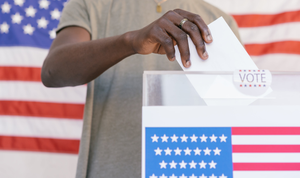America
US Presidential Election 2024: How Would the Race Change If President Biden Opts to Leave the Campaign Trail?

July 1 :
Following US President Joe Biden's dismal showing in the presidential debate against rival Donald Trump, speculation has resumed on the consequences should the seasoned Democrat abruptly resign as party nominee. In the history of American elections, no such daring political about-face has ever been seen. This is an investigation into potential ways to replace the 81-year-old.
At their respective political parties' summer nominating conventions, delegates from each of the fifty states formally appoint a candidate based on primary votes.
The approximately 3,900 party delegates who will be attending the convention in Chicago this August are owed a debt of gratitude by Biden, who won the primary votes by an overwhelming margin. The delegates would need to select a successor in the event that Biden steps down. If that happened, American politics would revert to the dark ages, when party leaders squabbled in smoke-filled rooms and voted interminably to select a nominee.
The shocking announcement that President Lyndon B. Johnson would not be seeking reelection came on March 31, 1968, smack dab in the midst of the Vietnam War.
A political crisis ensued at that year's convention in Chicago as a result of the action, with left-leaning delegates enraged by party-picked candidate Hubert Humphrey's pro-war attitude and demonstrators taking to the streets. After the disaster, more and more states used the primary process, and now conventions are well-organized occasions with predictable results because of the primaries.
In the event that a candidate is required to resign after receiving official nomination at the convention, the official governing body of the respective party—the Democratic National Committee or the Republican National Committee—would convene in an emergency session to propose a replacement. Until now, the Democrats have rallied behind their chosen candidate, at least when making public statements; even former president Barack Obama has stepped forward to support Joe Biden.
Concerning the possibility of Biden resigning, Michael Tyler, the campaign's director of communication, informed reporters on board Air Force One that there had been "no conversations about that whatsoever."
His 2020 running mate, Vice President Kamala Harris, is an obvious (though not inevitable) choice to succeed Biden. The 59-year-old was dispatched on June 27 to quell the furor around the Democratic president's underwhelming performance. He admitted that Biden had been "slow to start" the debate but had "finished strong."
But if that fails, we could hear from one of several formidable Democratic politicians, including Michigan's Gretchen Whitmer, Pennsylvania's Josh Shapiro, or California's Gavin Newsom.
However, might a formidable third-party candidate arise at this time? The two-party system in the United States is safe from challenge from any independent candidates at this time. Ross Perot, an entrepreneur from Texas, garnered approximately 19% of the vote in 1992 while running as an independent But in the end, he didn't get a single vote from the 538 Electoral College members who pick the winner—all because of the whims of the American electoral system.



































